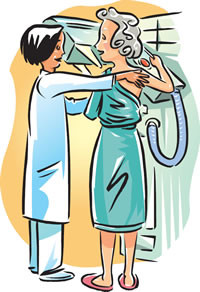Recent Blog Articles

What? Another medical form to fill out?

How do trees and green spaces enhance our health?

A muscle-building obsession in boys: What to know and do

Harvard Health Ad Watch: New drug, old song, clever tagline

Concussion in children: What to know and do

What color is your tongue? What's healthy, what's not?

Your amazing parathyroid glands

When — and how — should you be screened for colon cancer?

Co-regulation: Helping children and teens navigate big emotions

Dog bites: How to prevent or treat them
Screening Tests for Women Archive
Articles
Good news about early-stage breast cancer for older women
Image: Thinkstock |
Although the chance of developing breast cancer increases after age 60, the likelihood of dying from it is low.
If you're like most women, you consider the possibility of learning you have breast cancer every time you have a mammogram. But breast cancer probably doesn't seem as scary as it did when you were younger, because there has been so much good news about breast cancer in the last 20 years—improvements in mammography, advances in surgery and reconstruction, and drugs that are more effective and less toxic.
Ask the doctor: Should I be screened for lung cancer?
Q. I smoked for 10 years during my wayward youth. I stopped 25 years ago, but now I worry about my risk for lung cancer. What can I do to prevent it? Should I be screened?
A. Fortunately, you have already done the most important thing possible to prevent lung cancer: you quit smoking. There isn't much more you can do to decrease your risk of lung cancer except avoid secondhand smoke and follow a healthy diet.
Are screening mammograms worth it after age 70?
For decades the controversy over breast cancer screening has centered around the age at which women should begin having mammograms. Recently, a new question has arisen: When should women stop regular screening? A report from the Netherlands suggests an answer: before age 75.
In the study, published in the Sept. 15, 2014, issue of the journal BMJ, researchers from Leiden University looked at the effects of raising the age limit for screening from 69 to 75 in 1995. Using the data from— the National Cancer Registry, the researchers calculated that for every advanced cancer detected by screening, about 20 early-stage cancers were found. About 60% of early cancers were ductal carcinomas in situ (precancerous lesions) or stage I cancers (small tumors confined to the breast).
Latest thinking on mammograms for older women
New evidence shows the tests may benefit women older than age 75.
Just as it is for younger women, routine breast cancer screening for older women is debated. The U.S. Preventive Services Task Force (USPSTF) recommends against routine mammograms for women 75 and older at average risk of breast cancer. But the American Cancer Society and other health agencies recommend that screenings continue annually as long as women are in good health. "That's because the best data we have for mammography is for women between the ages of 40 and 75. That doesn't mean mammography won't reduce the death rate from breast cancer after age 75; it's just never been studied in randomized controlled trials," says Dr. Phoebe Freer, a radiologist at Harvard-affiliated Massachusetts General Hospital.
Should you say goodbye to the annual pelvic exam?
The pelvic exam has been part of the "well-woman" visit for generations. According to new guidelines from the American College of Physicians (ACP), that ritual may be coming to an end. In the July 1, 2014, Annals of Internal Medicine, the organization recommends against pelvic exams for women who are neither pregnant nor have symptoms of pelvic disease.
The pelvic exam evolved over decades because it seemed a logical way to screen for fibroids and benign cysts as well as uterine and ovarian cancers. The term refers to the bimanual exam, in which the vagina is dilated with a speculum and the clinician places one hand inside the patient's vagina and the other on her abdomen to feel the ovaries, uterus, and other pelvic organs. The new recommendation was developed after a review of 52 studies found no evidence that pelvic screening reduced disease or saved lives. About 30% of the women in the studies reported some distress associated with the exam, including anxiety, embarrassment, and physical pain.
Predicting heart disease risk in women
Image: Thinkstock "Biomarkers could be used both for predicting disease risk and for selecting those who would potentially bene t most from therapy." |
Biomarkers could give your doctor a window into your heart risks, so you can start making changes to reverse them.
Breast cancer screening: Options beyond the mammogram
The mammogram remains the foundation of breast cancer screening, but variations on this test can improve detection for some women.
The mammogram isn't a perfect test, but it's the best one we have right now for identifying breast cancers early, which is why it remains the cornerstone of breast cancer detection. "For the woman at average risk for breast cancer, it is the only proven screening test," says Dr. Robyn Birdwell, associate professor of radiology at Harvard Medical School and section head in the Division of Breast Imaging at Brigham and Women's Hospital.
Ask the doctor: When should I stop getting screening tests?
Q. I am in my early 80s, and my doctor has not yet told me when I can stop getting mammograms, colonoscopies, and Pap tests. I'm due for my annual visit soon. Are there any guidelines for when women can stop getting these tests?
A. Yes. For women with a history of normal cancer screening tests, the U.S. Preventive Services Task Force recommends stopping Pap tests at age 65, and stopping mammograms and colonoscopies at age 75.
Should you seek advanced cholesterol testing?
Special tests measure different types of fat particles in the blood. But whether the results can improve your health remains uncertain.
Earlier this year, a leading women's magazine featured an article about heart health in your 50s and beyond that included this advice: "During your annual physical, consider asking for a specialized vertical auto profile (VAP) test, a detailed lipid profile that helps identify plaque buildup in your arteries." (Lipid is another word for fat).
Should you be tested for dementia?
Image: Thinkstock |
Widespread screening isn't recommended, but symptoms are cause to get evaluated.
We routinely undergo mammograms and colonoscopies with the objective of catching breast and colorectal cancer early, when they're most treatable. So why don't we also get periodically screened for dementia using questionnaires, blood tests, or imaging scans? The U.S. Preventive Services Task Force—a panel of disease prevention experts—advises that there is no proven value in screening women without cognitive problems.
Recent Blog Articles

What? Another medical form to fill out?

How do trees and green spaces enhance our health?

A muscle-building obsession in boys: What to know and do

Harvard Health Ad Watch: New drug, old song, clever tagline

Concussion in children: What to know and do

What color is your tongue? What's healthy, what's not?

Your amazing parathyroid glands

When — and how — should you be screened for colon cancer?

Co-regulation: Helping children and teens navigate big emotions

Dog bites: How to prevent or treat them
Free Healthbeat Signup
Get the latest in health news delivered to your inbox!
Sign Up





